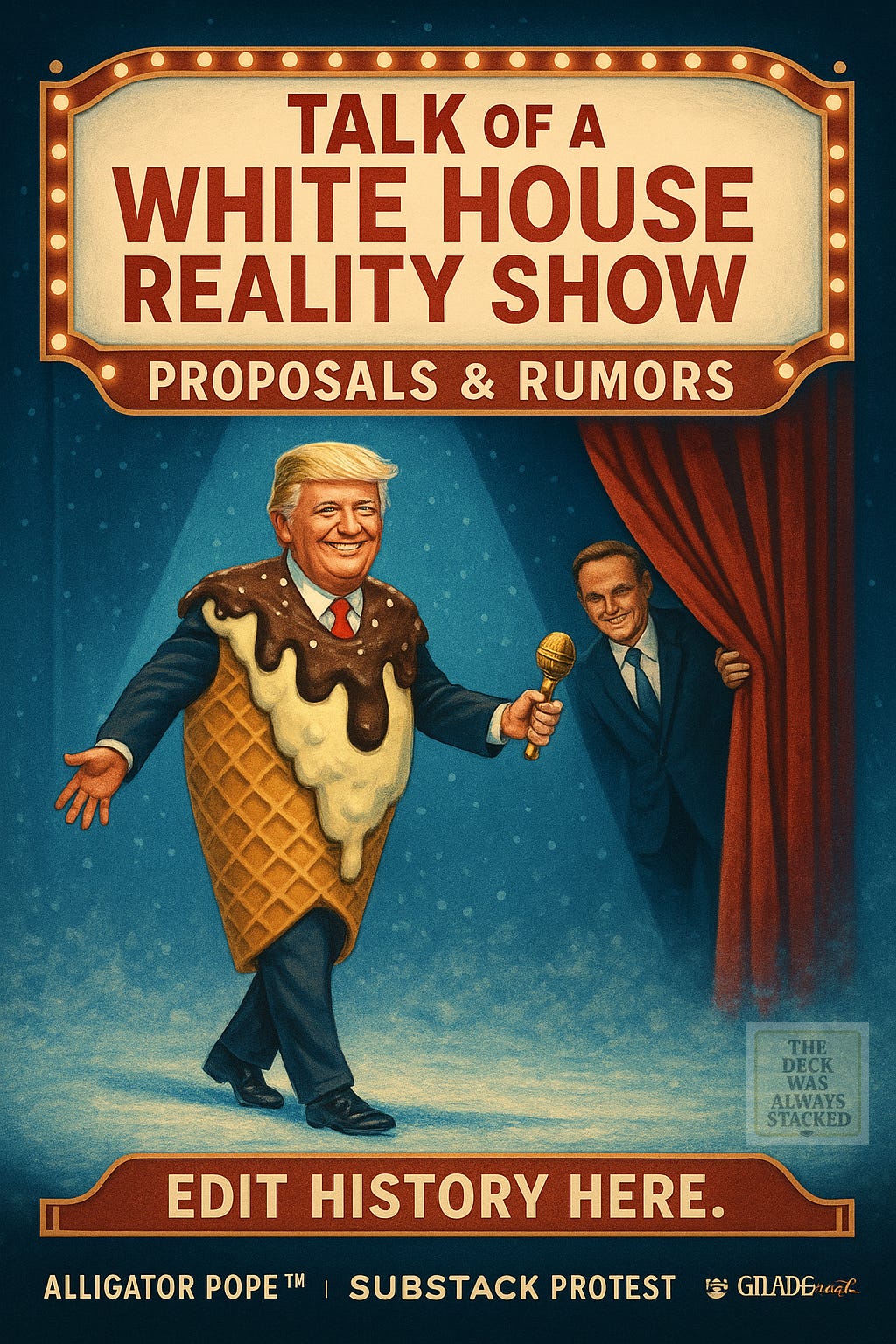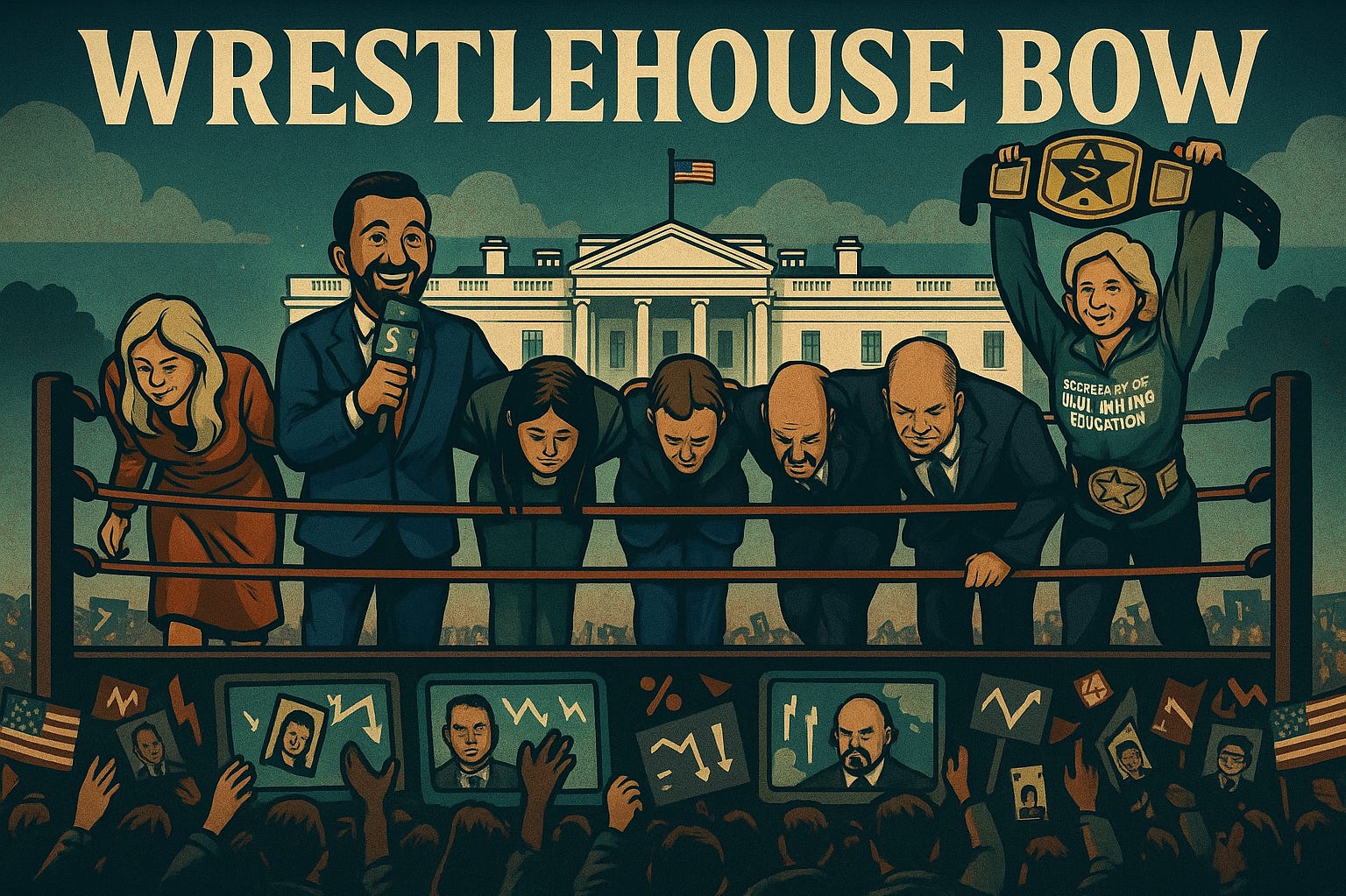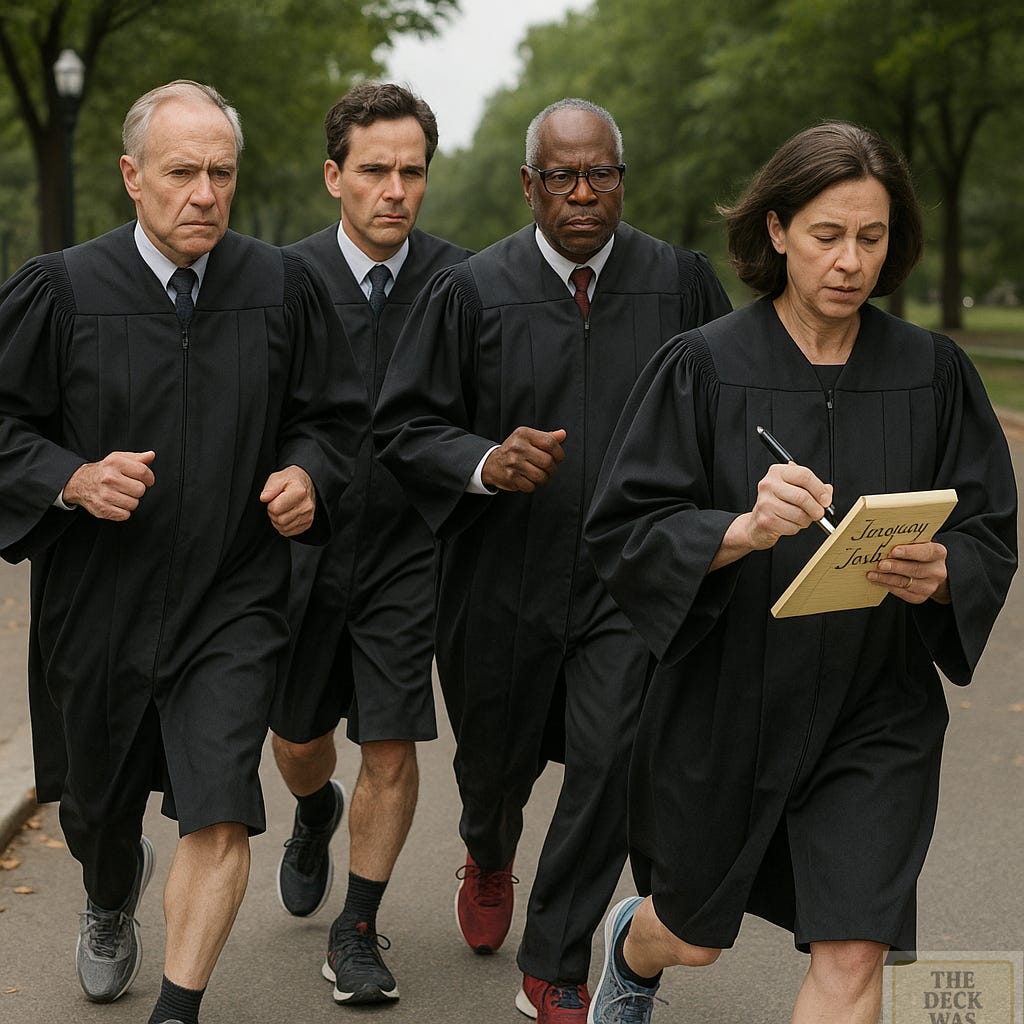THE DECK | 🧊 White House Reality Show:
Proposals, Rumors, and the Gilded Stage

🧊 Talk of a White House Reality Show: Proposals & Rumors
Trump, Burnett, and the Ice Cream Taco Economy
The year was 2017. The President of the United States clasped hands with TV mogul Mark Burnett — not on a red carpet, but mid-stage in full campaign glow. It looked like a reunion of old friends. Because it was.
Burnett, the producer behind *The Apprentice*, wasn’t just a friend — he was arguably Trump’s biggest PR asset pre-White House. And after the presidency? It seems Trump wanted the cameras back.
Trump, GOP and the “Reality Show” White House Idea (2023–2025)
Overview: During and after Donald Trump’s presidency, various figures – including Trump himself, his allies, and commentators – have drawn parallels between the White House and reality TV. From serious proposals of turning presidential politics into televised entertainment, to satirical critiques framing Trump’s tenure as a “reality show,” the notion has surfaced repeatedly. Below, we summarize key statements and coverage from 2023–2025 (with context from earlier where relevant) and clarify whether they were meant as satire, genuine plans, or promotional talk.
Talk of a White House Reality Show: Proposals & Rumors
“The Apprentice: White House” – A Post-Presidency Plan: Back in late 2019, reports emerged that Trump and TV producer Mark Burnett (creator of The Apprentice) discussed launching a new reality TV series called “The Apprentice: White House.” This show would have been “all-politics,” capitalizing on Trump’s stint as Presidentthewrap.com. The idea was to leverage the Oval Office experience as entertainment – essentially turning Trump’s White House tenure into a TV setting. One insider noted the concept “could be lucrative,” though another source said the talks “did not go far”thewrap.com. This indicates the proposal was seriously considered (as a business venture), albeit briefly. It was not a satirical joke; rather, it was a promotional idea floated by Trump’s team for after he left office. (No show ultimately materialized.)
Campaign Trail Hyperbole: During the 2016 campaign (a bit earlier than our 2023–2025 focus, but notable for context), even some Trump supporters mused about a reality-show style presidency. For example, gay adult film actor Colby Keller drew attention in 2016 for saying he’d vote for Trump because “at the very least he’d turn the White House into a reality show. America would tune in, right?”thepinknews.com. Keller quipped that such a show could even raise money for good causes. This statement was serious in intent (from the supporter’s perspective) – he literally hoped the presidency would be run like a TV show – but also had a provocative, almost tongue-in-cheek tone (he was a communist artist making a point about “destabilizing” politics). Regardless, it shows the idea of a White House reality show had entered public discourse even before Trump took office, viewed by some fans as an exciting prospect.
Rumors in 2024–25: In the lead-up to the 2024 election and beyond, the notion of a “reality show White House” persisted mostly as commentary and jabs, rather than official plans. There were no confirmed new proposals from Trump or GOP officials to literally film a reality series in the White House during this period. (One tangential rumor in 2025 involved a pitch for a DHS-backed reality competition where immigrants compete for citizenship – quickly debunked by officials as a “hoax”dhs.gov – but this was about immigration policy, not the White House itself.) By and large, talk of turning the White House into a reality show in 2023–2025 was framed by media and critics, not as a formal Trump campaign promise.
Commentary: White House as a Reality TV Stage
Media & Critics Calling it a “Reality Show”: Trump’s flamboyant style in office led many mainstream observers to describe his presidency itself as “a reality show.” Reuters, reviewing his tenure as it ended, wrote that Trump made himself “the center of attention, the star of a literal reality show that was his administration,” always playing to cameras and dramareuters.com. Virtually everyone “tuned in,” supporters and critics alike, to this unprecedented political spectaclereuters.com. The choice of words (“literal reality show”) by a major news agency underscores that this was serious analysis, not satire – seasoned journalists noted Trump’s governance often resembled unscripted TV.
“Great Television” in the Oval Office: In a March 2025 piece, The Atlantic recounted how Trump would consciously stage events for entertainment value. Notably, during a 2019 Oval Office meeting with Ukraine’s President Zelensky, Trump capped the contentious exchange by declaring, “This is going to be great television.”theatlantic.com. This wasn’t a joke – it was a revealing boast. Trump viewed high-level meetings through a TV-production lens. The Atlantic dubbed Trump the “First True Reality TV President,” noting he “cast” key administration roles based on looks and unveiled decisions (like Supreme Court picks) as if it were “The Bachelor,” offering roses in a finaletheatlantic.com. Such commentary, laden with reality-show metaphors, was satirical in tone but also rooted in actual behavior observed from Trump and his team. It illustrates that mainstream outlets seriously grappled with how Trump injected reality TV tactics into the White House.
David Frum’s “Surprise the World Leader” Quip: In late 2018, former Bush speechwriter David Frum lampooned Trump’s habit of blindsiding foreign leaders on camera. After Trump ambushed South Africa’s president with dubious claims in a televised meeting, Frum told CNN it felt like “promoing a new reality show in the White House – ‘Surprise the World Leader.’”abc.net.au. He mockingly described how visiting heads of state might get prizes or a “goat behind curtain number three” as if on a game showca.news.yahoo.comabc.net.au. Frum’s acerbic remark was satire, using humor to criticize Trump’s unorthodox meeting style. It wasn’t an actual plan from Trump’s team – it was a conservative critic riffing that Trump had turned serious diplomacy into a TV stunt. The very specificity of the fake show name (“Surprise the World Leader”) shows how credible the “reality show” framing seemed to political observers at the time.
White House Press as Episodes: Trump’s own conduct reinforced the reality-show narrative. He often bragged about TV ratings for his appearances. For instance, during the COVID-19 crisis, *Trump “bragged” about the “ratings” his press briefings were gettingtheatlantic.com – treating critical pandemic updates like episodes vying for viewers. He staged events like firing FBI Director Comey with prime-time drama, and held cabinet meetings and bill signings that sometimes felt like set pieces for the cameras. Commentators noted he governed by creating cliffhangers and drama (“tune in next week” energy) rather than policy work. This was not promoted as a positive by his officials, but it was an observable reality that media across the spectrum — from Fox News to CNN — commented on (often with alarm or derision).
Satire vs. Serious Intent: Which Was It?
Satire/Mockery: Many references to a White House reality show were tongue-in-cheek jabs. David Frum’s “Surprise the World Leader” and late-night hosts’ jokes (e.g. likening Trump’s cabinet shuffles to Survivor eliminations) fall in this category. The goal here was to satirize Trump by exaggerating his flair for drama. Another example: The Daily Show and political cartoonists frequently portrayed Trump’s administration as a chaotic TV show. These were never actual proposals – they were commentary and humor.
Genuine Proposals/Desires: On the other hand, a few instances showed earnest interest in leveraging Trump’s presidency for reality TV:
The Burnett pitch for “Apprentice: White House” was a serious (if fleeting) idea entertained by Trump’s inner circlethewrap.com – demonstrating Trump’s own openness to merging his presidential persona with entertainment ventures.
Trump’s personal statements praising his TV ratings and showmanship suggest he relished the idea of running the White House as a form of spectacle. He often acted as both president and producer, blurring governance with performance. While Trump did not outright say “I will make a reality show in the White House” during the 2024 campaign, he frequently emphasized showy rallies, media dominance, and “television” moments as measures of success. This implies a promotional mindset, if not an explicit TV show plan.
Promotional Talking Points: Within MAGA circles, there was an element of pride in Trump’s entertainment value. Some supporters (like Colby Keller in 2016) promoted the idea that Trump’s White House would be fun to watchthepinknews.com. In the 2024 cycle, Trump’s team leaned into his outsider/entertainer image – for example, releasing cinematic style campaign videos and selling rally footage – but stopped short of announcing any “White House live show.” It was more implied branding: “elect Trump, get the most exciting presidency ever.” The GOP as a whole didn’t formally endorse turning government into a TV show; however, they often defended Trump’s unconventional press events and social media antics as him “speaking directly to the people,” which indirectly frames it like a continuous show for his base.
Mainstream Coverage & Legacy
Major news outlets in 2023–2025 continued to analyze Trump’s reality-TV approach as he sought a second term. PBS NewsHour, for instance, discussed how Trump’s inner circle for a potential 2025 administration included media personalities and even former reality TV stars, calling it a “nuclear-armed reality show” cabinet in the makingscmp.com. This was serious commentary on how governance might look under Trump redux – essentially suggesting he’d double down on showmanship.
International media noticed too: European coverage contrasted Biden’s more traditional style with Trump’s “reality show in the White House” that preceded iten.ejo.ch. This indicates that the “White House as reality show” notion became a kind of shorthand worldwide for Trump’s era – not promoted by Trump himself as an accomplishment, but recognized broadly as a defining feature.
(Alt text: A red “Keep America Great” cap flies through the air after being tossed from a stage, as a gloved hand waves and an American flag billows in the background – evoking the theatrical fanfare of Trump’s rallies.) During Trump’s rallies, moments like this – a hat throw into the crowd – were deliberately staged like TV moments. Such imagery fed the idea that the Trump political experience was akin to a reality TV spectacle, where dramatic visuals and crowd engagement took center stage.
Conclusion
In summary, the concept of turning the White House into a reality TV show has been mostly a metaphor and critique, highlighting Trump’s unprecedented fusion of entertainment and politics. No official program ever broadcast daily life in the White House as a reality series, and suggestions that Trump or GOP insiders wanted to do so largely fall into three buckets:
Satire/Criticism: Political opponents and commentators used the “reality show” line to mock or alarm (e.g. Frum’s quip, network pundits lamenting “the reality-TV presidency”theatlantic.com). This was not literal advocacy, but rather a warning that governance was devolving into theatrics.
Sincere Promotion: A few supporters and members of Trump’s circle flirted with the idea as a positive thing – leveraging Trump’s TV savvy. The Burnett Apprentice: White House discussionsthewrap.com, and comments like Keller’sthepinknews.com, show genuine (if unconventional) enthusiasm for a White House reality show concept. These were serious in intent, viewing the presidency itself as content to be monetized or enjoyed.
Trump’s Own Embrace of Showmanship: While Trump did not launch a reality TV show from the Oval Office, he ran the White House as if it were on reality TV. This was evidenced by his casting-call hiring, on-camera surprises, focus on optics, and references to ratingstheatlantic.com. In effect, he realized much of the “White House reality show” idea in practice, if not by name. This was neither purely satirical nor an outward policy – it was a governing style that blurred into entertainment. Trump often seemed to treat the American public like an audience and the presidency as a continuing series – a dynamic noted by sources from The Atlantic to Reutersreuters.com.
Ultimately, the notion of a White House reality show serves as a powerful metaphor for Trump’s impact on U.S. politics. It started as an outlandish idea and a jest, but by 2025 even sober analysts acknowledge that Trump brought reality TV conventions to the highest office.theatlantic.comreuters.com Whether viewed with humor or alarm, the “reality show White House” concept underscores the changing nature of political communication in the Trump era – one where policy and spectacle often intermixed, and where the American presidency sometimes felt like a program people hate-watch or eagerly binge.
Sources:
Reuters – “Trump sought the world’s attention and got it. Now the White House reality show ends.” (Jeff Mason, 2021)reuters.com
The Atlantic – “Trump Is Breaking the Fourth Wall” (Megan Garber, 2025)theatlantic.comtheatlantic.com
The Daily Beast / TheWrap – report on Trump and Mark Burnett discussing “The Apprentice: White House” in 2019thewrap.com
PinkNews – Colby Keller interview quote (2016) on hoping for a White House reality showthepinknews.com
CNN (via ABC News transcript) – David Frum’s “Surprise the World Leader” satire (2018)abc.net.au
Washington Examiner/YouTube – Tiana Lowe Doescher commentary (2025) on Trump’s reality show-like tacticsyoutube.com (analysis of Trump adjusting policy like a TV plot)
(Additional context from PBS, LA Times, and others have been integrated in summary; see reference links for more details.)
Alligator Pope ™. | Truth Engine 2550
### 🧠 #TruthEngine2550 | 🃏 #AlligatorPope | 🌮 #DropTheTaco






